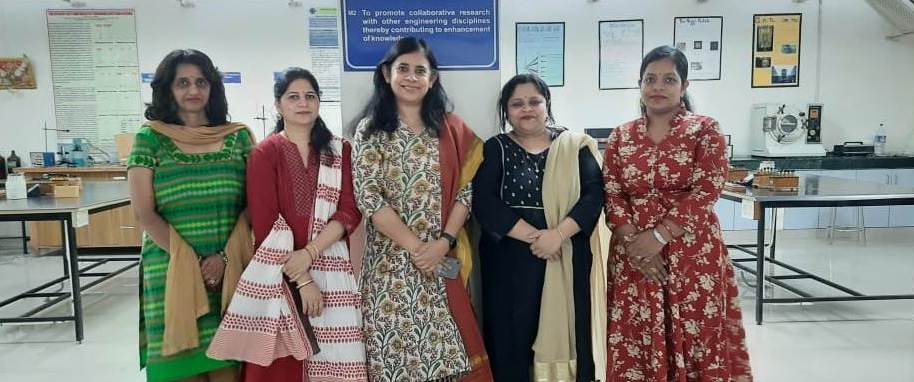
Department of Physics, JSSATEN is a lively department with an active research program in various branches of Physics. The department offers theory and practical subjects as per the syllabus of affiliated university to all the B.Tech 1st year students. It also offers a host of science based open elective subjects to B.Tech II year students. Department has a well equipped Laboratory. It has state of art instruments and students are trained to handle instruments like CRO, Optical Fiber Kit, Ultrasonic Instruments, and Creation of Vacuum etc. Students are encouraged to participate in various projects and extracurricular activities planned for them by the faculty members. Student society SPADE formed under the umbrella of Physics Department also engages in activities to motivate and bring out talent of all students.
Department of Physics is one of the research centres of the university. Faculties are engaged in research and development activities in the area of Condensed Matter Physics, Statistical Mechanics, and Nuclear Resonance, Plasmonics etc. Faculty members in the Department are Ph.D or persuing the same. All of them enthusiastically participate in research activities by presentation of their work in national and international conferences, workshops and also by publishing papers in quality scientific journals.
| # | Program Outcomes :-The Graduates will be able to: |
|---|---|
| PO-1 | Engineering Knowledge: Apply the knowledge of mathematics, science, engineering fundamentals, and an engineering specialization to the solution of complex engineering problems. |
| PO-2 | Problem analysis: Identify, formulate, review research literature, and analyze complex engineering problems reaching substantiated conclusions using first principles of mathematics, natural sciences, and engineering sciences. |
| PO-3 | Design/development of solutions: Design solutions for complex engineering problems and design system components or processes that meet the specified needs with appropriate consideration for the public health and safety, and the cultural, societal, and environmental considerations. |
| PO-4 | Conduct investigations of complex problems: Use research-based knowledge and research methods including design of experiments, analysis and interpretation of data, and synthesis of the information to provide valid conclusions. |
| PO-5 | Modern Tool Usage: Create, select, and apply appropriate techniques, resources, and modern engineering and IT tools including prediction and modeling to complex engineering activities with an understanding of the limitations. |
| PO-6 | The Engineer and Society: Apply reasoning informed by the contextual knowledge to assess societal, health, safety, legal and cultural issues and the consequent responsibilities relevant to the professional engineering practice. |
| PO-7 | Environment and Sustainability: Understand the impact of the professional engineering solutions in societal and environmental contexts, and demonstrate the knowledge of, and need for sustainable development. |
| PO-8 | Ethics: Apply ethical principles and commit to professional ethics and responsibilities and norms of the engineering practice. |
| PO-9 | Individual and Team Work: Function effectively as an individual, and as a member or leader in diverse teams, and in multidisciplinary settings. |
| PO-10 | Communication: Communicate effectively on complex engineering activities with the engineering community and with society at large, such as, being able to comprehend and write effective reports and design documentation, make effective presentations, and give and receive clear instructions. |
| PO-11 | Project Management and Finance: Demonstrate knowledge and understanding of the engineering and management principles and apply these to one’s own work, as a member and leader in a team, to manage projects and in multidisciplinary environments. |
| PO-12 | Life-long learning: Recognize the need for, and have the preparation and ability to engage in independent and life-long learning in the broadest context of technological change. |
Details of Lab facilities
| Name of the Laboratory | Name of the Important Equipment |
|---|---|
| Engineering Physics Laboratory | Ultrasonic interferometer (Liquids) working at varying temperatures, Abbe’s Refractometer, Glass made pyknometer and viscometer, Double walled glass jacket for water circulation, Water bath, Electronic balance, Oven. Newton’s Ring Apparatus, Variation of magnetic field set up, Carey-Foster’s Bridge set up, ECE of copper set up, Diffraction grating set up, Polarimeter set up . Stefan’s Law Verification set up, Electronic balance, Nodal Slide Set Up, Hall Effect Set Up, Energy Band Gap (Four Probe)Set Up, Magnetic Susceptibility Set Up, Ballistic Galvanometer, Helium-Neon Laser, Diode Laser, Potentiometer, Biprism. |
| # | (Specialization) |
Yrs |
||||||
|---|---|---|---|---|---|---|---|---|
| 1 | Dr. Manisha Chaudhary | Ph.D.(Condensed Matter-Liquid Crystal) | Assistant Professor | 13.08.2007 | dr_manisha@jssaten.ac.in | |||
| 2 | Dr. Nidhi Yaduvanshi | Ph.D (Condensed Matter-Thin Films) | Assistant Professor | 11.08.2007 | nidhiyaduvanshi@jssaten.ac.in | |||
| 3 | Dr. Pratima | Ph.D | Assistant Professor | 09.08.2010 | pratimarajput@jssaten.ac.in | |||
| 4 | Dr. Divya Ghildyal | Ph.D(NMR) | Assistant Professor | 19.12.2011 | divyaghildyal@jssaten.ac.in | |||
| 5 | Dr. Pankaj Kumar Sharma | Ph.D (Spectroscopic Studies of Materials) | Assistant Professor | 14.12.2022 | pankaj.sharma@jssaten.ac.in | |||
| 6 | Dr. Nupur Gupta | Ph.D (Material Science - Oxide Glasses) | Assistant Professor | 21.10.2024 | nupur.gupta@jssaten.ac.in | |||
| 7 | Dr. Alok Singh | Ph.D Applied Physics (Plasmonics based Sensor and Photovoltaic) | Assistant Professor | 13.12.2024 | alok.singh@jssaten.ac.in |
| Mr. Chethan Kumar H K | |||||
| Mr. Basavraju.C |